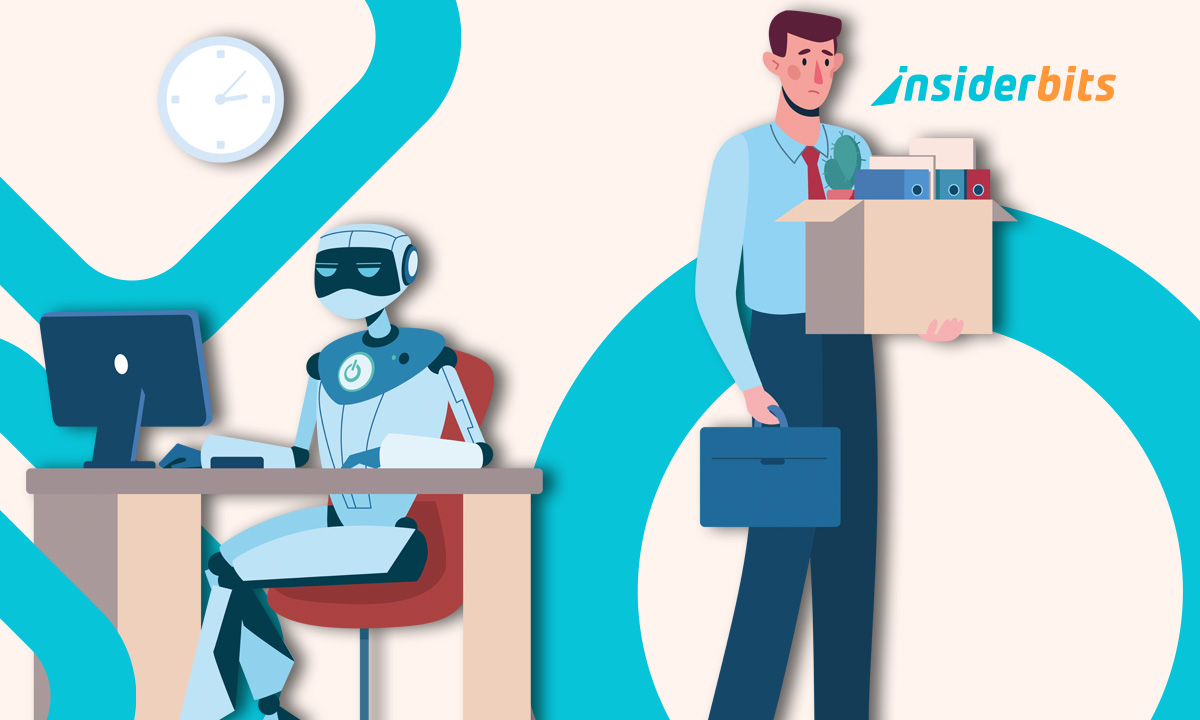The idea of traditional jobs obsolete may sound like a distant threat, but it’s already taking shape as AI reshapes entire career paths. Rather than eliminating every profession, AI is changing work, transforming repetitive tasks into automated routines and creating space for new expertise.
This evolution demands a proactive mindset, where adaptability becomes essential for long-term career stability. Understanding where AI is headed and how it changes work patterns helps individuals prepare, not panic, as they step into a new economic reality.
- Mit Indeed auf der Suche nach den besten Jobs
- Wie man sich für Amazon Jobs bewirbt
- Wie man als Einwanderer Jobs in den USA findet
The Future of Work: Which Industries Are Most at Risk?
First of all, we need to understand that automation doesn’t strike randomly, it begins where tasks follow predictable patterns, especially in sectors that rely on structured, rule-based processes.
For instance, customer service roles are often among the first affected, as chatbots and virtual assistants now handle inquiries and scheduling with growing fluency.
Another service that has been changing is transportation, with self-driving technologies being tested for logistics and delivery services that once depended on human drivers.
Meanwhile, manufacturing continues its decades-long march toward full automation, reducing human oversight in assembly lines and routine quality control.
On the other hand, healthcare and education feel this shift in subtler ways.
Retail roles, especially those tied to inventory and transaction processing, are giving way to automated checkouts and predictive restocking algorithms.
This doesn’t mean total replacement, but a redrawing of job boundaries, where human involvement becomes more strategic than procedural.
Understanding these shifts helps workers anticipate where disruption is likely and plan their next steps from a position of awareness, not surprise.
Will AI Make Traditional Jobs Obsolete?
To answer that question, we first need to make it clear that traditional roles aren’t disappearing overnight, but many are changing form, losing their static nature in favor of fluid responsibilities shaped by algorithms.
Jobs once defined by repetition or linear execution now require flexibility and tech-literacy, as AI tools take over core processes and redefine value.
Also, basic customer support no longer relies on human attention the way it did, creating pressure on workers to evolve.
At the same time, professions that rely on empathy and complex decision-making remain more resilient.
Some jobs may vanish, but many will simply be restructured, demanding new skills within old titles or shifting tasks to adjacent fields.
The idea of traditional jobs obsolete, then, reflects a world where job descriptions dissolve and reassemble in ways that require constant adaptation.
In this sense, experts emphasize that while AI transforms labor, it also enhances productivity, allowing humans to focus on more creative and meaningful work.
The challenge lies in how quickly individuals and institutions can keep up with that transformation, both culturally and educationally.
New Jobs Created by AI and Automation
Even with all these major changes, while AI reshapes old careers, it also gives birth to entirely new professions that didn’t exist a decade ago, many centered on guiding or auditing technology.
Prompt engineering, for instance, has emerged as a vital field where professionals shape AI outputs through refined input design and conceptual clarity.
And there’s more: AI ethicists and compliance specialists now play a critical role in ensuring that automated systems operate fairly and transparently across diverse populations.
Automation engineers also help companies integrate AI systems into legacy infrastructure, preserving efficiency while minimizing operational risk.
These emerging paths prove that AI isn’t a job killer.
The most valuable professionals in this era will be those who understand how machines learn and how humans can uniquely contribute. With the right preparation, these new careers offer sustainable, future-proof alternatives to vulnerable legacy roles.
And while demand for technical specialists is rising, non-technical roles with AI fluency will also gain prominence across management and strategy sectors.
How to Adapt Your Career to AI Changes
From now on, career adaptation begins with mindset. Those who treat change as an opportunity rather than a threat are best positioned to navigate disruption with confidence.
People seeking to learn and adapt to this new era can use platforms like Coursera, edXund LinkedIn Lernen.
These platforms offer flexible access to in-demand skills, from machine learning basics to human-AI interaction.
Remember that reskilling doesn’t require full career pivots, but rather layering new competencies over existing strengths to remain valuable in hybrid job environments.
Mentorship and peer networks also help professionals stay current, as learning from others often reveals shortcuts and practical insights not found in courses.
The goal isn’t to outpace machines, but to work alongside them, doing what they can’t, managing what they automate, and guiding their implementation with intent.
As AI reshapes the workplace, careers evolve through continuous growth, not through clinging to outdated routines or static expertise.
The Ethical Debate Around AI in the Workplace
Firstly, all this ethical debate around AI in the workplace centers on how responsibility is distributed when machines make decisions that affect people’s lives.
Concerns about algorithmic bias and reduced autonomy have prompted urgent calls for regulation and stronger human oversight.
Also, this debate focuses on access to AI education and reskilling. This is seen as another critical issue, since unequal opportunities risk deepening social and economic divides.
Experts stress that ethics must be a structural pillar, not an afterthought, to ensure AI serves people rather than marginalizes them.
Ultimately, ethical clarity will be essential to guide progress responsibly.
Traditional Jobs Obsolete: Will AI Reshape the Future of Work? – Conclusion
The question of traditional jobs obsolete is more about transformation, where roles shift to reflect new technological realities.
As you see in this article, AI doesn’t erase purpose from the workplace but asks humans to redefine it, expanding into areas that machines can’t meaningfully reach.
From ethical leadership to creative insight, the future of work depends on our willingness to adapt with empathy, agility, and vision.
Those who embrace change and equip themselves with relevant skills will not only survive the shift, but shape what work becomes next.
Verwandt: AI Job Matching: Schneller zum Traumjob im Jahr 2025
Hat Ihnen dieser Artikel gefallen? Speichern Sie den Insiderbits-Blog unter Ihren Favoriten, um die neuesten Tools, kreativen technischen Tipps und bahnbrechenden Entwicklungen in der Bildbearbeitung zu erhalten!





